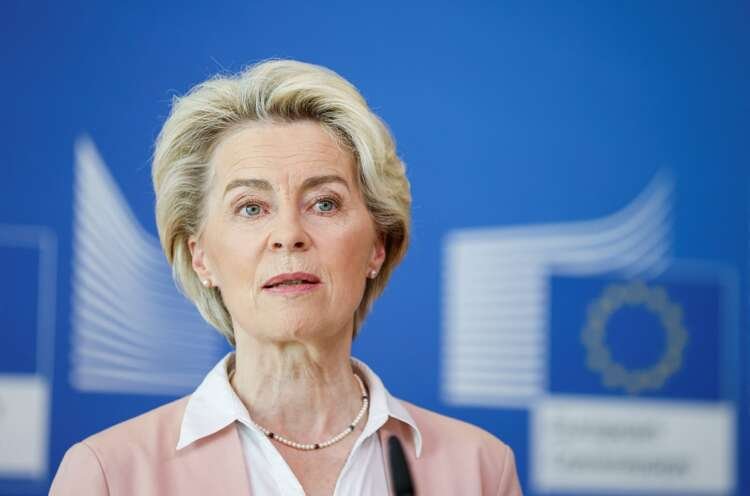‘Wind of change’ in Europe as path to EU opens for Ukraine


By Philip Blenkinsop and Marine Strauss
BRUSSELS (Reuters) -European leaders will formally accept Ukraine as a candidate to join the EU on Thursday, a bold geopolitical move triggered by Russia’s invasion of Ukraine but a reminder that the 27-nation bloc will need a major overhaul as it looks to enlarge again.
“History is on the march,” European Union chief executive Ursula von der Leyen said ahead of a two-day summit that will kickstart the EU’s most ambitious expansion since welcoming Eastern European states after the Cold War.
“I am not just talking about Putin’s war of aggression,” she said. “I am talking about the wind of change that once again blows across our continent. With their applications, Ukraine, Moldova and Georgia are telling us that they want change.”
Although it will take Ukraine and Moldova years – and perhaps more than a decade – to qualify for membership, the Brussels summit decision will be a symbolic step that signals the EU’s intention to reach deep into the former Soviet Union.
“This is like going into the light from the darkness,” Ukraine’s President Volodymyr Zelenskiy said on Wednesday, welcoming the bloc’s expected green light.
Russian President Vladimir Putin says his “special military operation” launched in Ukraine in late February was partly necessitated by Western encroachment into what Russia characterises as its rightful geographical sphere of influence.
While Ukraine and neighbouring Moldova are expected to be welcomed into the EU’s waiting room on Thursday, Georgia will be given “a European perspective” but told it must fulfil conditions before winning candidate status.
“Today the EU is sending a message of solidarity to the people of Ukraine that you belong to the European family, that you belong to the EU … and you will get candidate status,” Irish Prime Minister Micheal Martin said as he arrived at the summit.
BALKAN FRUSTRATION
Behind the triumphant rhetoric, however, there is concern within the EU about how the bloc can remain coherent and united as it continues to enlarge.
“In a historical moment, we must give a strong signal to Ukraine,” Belgium’s Prime Minister Alexander De Croo said. But he added: “It does not mean Ukraine will join the EU quickly, it will take time.”
After starting in 1951 as an organisation of six countries to jointly regulate their industrial production, the EU now has 27 members that face complex challenges from climate change and the rise of China to today’s war on their own doorstep.
Reticence over enlargement has slowed progress towards membership for a group of Balkans countries – Albania, Bosnia, Kosovo, Montenegro, North Macedonia and Serbia – whose leaders will meet their EU counterparts in Brussels on Thursday morning.
A lack of progress on milestones to entry into the club has led to such a sense of disillusionment that the leaders of Albania and Serbia briefly considered not attending the meeting.
They agreed eventually to make the journey, but Albanian Prime Minister Edi Rama said as he arrived at the summit: “Welcome to Ukraine, it’s a good thing to give candidate status, but I hope the Ukrainian people will not have much illusions about this.”
A draft of the summit statement seen by Reuters showed that EU leaders will again give “full and unequivocal commitment to the EU membership perspective of the Western Balkans.”
But Ukraine’s fast track to formal candidate status has only served to increase their feeling of being sidelined, which carries the risk for the EU that Russia and China extend their influence into the region.
“The more the EU doesn’t give a unified and a clear sign to the Western Balkans, the more other malign factors will use that space and that vacuum,” Kosovo President Vjosa Osmani said in a hint to those concerns.
German Chancellor Olaf Scholz has said that the EU must “reform its internal procedures” to prepare for the accession of new members, singling out the need for key issues to be agreed with a qualified majority rather than by unanimity.
The requirement for unanimity often frustrates EU ambitions because member states can block decisions or reduce them to the lowest common denominator.
Despite waves of crises that have rocked the EU in recent years, from a wave of migration and Britain’s exit from the bloc to the rise of nationalism and tensions over standards of democracy, the bloc remains popular.
According to a survey by the EU’s parliament, nearly two-thirds of Europeans consider membership of the EU a “good thing”, the highest result in 15 years.
Still, leaders know that public discontent is mounting over a spike in inflation and an energy crisis as Russia tightens gas supplies in response to Western sanctions, and these economic concerns will be hotly debated on the second day of the summit.
(Additional reporting by Francesco Guarascion, Jan Strupczewski, Charlotte van Campenhout and Sarah Marsh; Writing by John Chalmers and Ingrid Melander)
Challenges of EU enlargement include maintaining cohesion among existing members, ensuring compliance with EU standards, and addressing concerns of member states regarding migration and economic impacts.
Explore more articles in the Top Stories category











